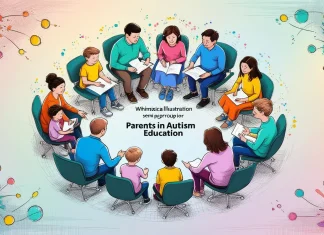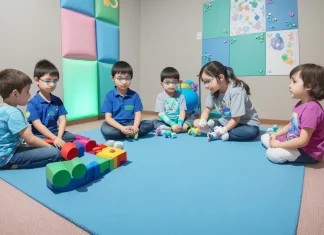Understanding Therapeutic Consulting
What is Therapeutic Consulting?
Therapeutic consulting is a specialized service designed to support children with autism by guiding parents and families through the selection and implementation of therapy programs. It acts as a bridge between therapy providers and families, offering personalized recommendations tailored to the unique needs of each child.
Importance of Therapy for Autistic Children
Autism, a spectrum disorder, brings diverse needs and strengths. Effective therapy can unlock a child’s potential, foster development, and improve the quality of life not only for the child but also for the family. Therapeutic consulting ensures that these therapies are well-suited, consistent, and coordinated to support long-term progress.
Core Aspects of Therapeutic Consulting for Autism
Identifying the Unique Needs of Each Child
Every autistic child is unique, and understanding their specific challenges and strengths is crucial. A skilled therapeutic consultant will assess the child’s sensory needs, communication challenges, social skills, and daily living skills to create a roadmap for their therapy journey.
Building Personalized Therapy Plans
After identifying needs, the consultant collaborates with therapists and family members to design an individualized therapy plan. This might include a mix of behavioral therapy, speech therapy, occupational therapy, and other specialized approaches tailored to help the child achieve their developmental goals.

Key Approaches in Autism Therapy
Behavioral Therapy
Behavioral therapy, including Applied Behavior Analysis (ABA), is one of the most widely used therapies for children with autism. It focuses on reinforcing positive behaviors and reducing behaviors that may be disruptive or harmful.
Speech and Language Therapy
This therapy is essential for children who struggle with verbal and non-verbal communication. Therapists work on building vocabulary, enhancing clarity of speech, and encouraging effective communication in social settings.
Occupational Therapy
Occupational therapy helps children develop the skills needed for daily living, like dressing, feeding, and hygiene. It also addresses sensory processing issues that many children with autism experience, helping them to better engage with the world around them.
Social Skills Training
Social skills training aims to help children with autism develop meaningful relationships. It involves teaching them how to interact appropriately with peers, understand social cues, and participate in group activities, fostering a sense of belonging and confidence.
How Therapeutic Consulting Supports Families
Parental Counseling and Training
Parents play an essential role in the therapeutic process. Consultants provide training and counseling to help them understand autism, address behavioral challenges at home, and reinforce therapeutic strategies outside of formal sessions.
Family Involvement in Therapy
Therapy is most effective when it extends beyond the therapist’s office. Therapeutic consultants encourage family involvement, guiding parents on how to support therapy goals at home and reinforcing learned skills in everyday situations.

Benefits of Therapeutic Consulting for Autistic Children
Improved Communication Skills
Through guided therapy sessions, children with autism can develop stronger communication skills, learning to express themselves better and understand others, which enhances their ability to engage socially.
Enhanced Social Interaction
Social skills are often challenging for autistic children, but therapeutic consulting can provide structured programs to build these skills, helping children develop friendships and engage more naturally with peers.
Increased Independence and Confidence
Therapeutic consulting promotes independence by teaching life skills and fostering a sense of achievement. This increases the child’s confidence and enables them to take on new challenges with greater ease.
Choosing the Right Therapeutic Consultant
Key Qualities to Look for
A good therapeutic consultant should be compassionate, experienced in working with autistic children, and knowledgeable about different therapeutic methods. They should also be great listeners, willing to understand and address the family’s concerns.
Questions to Ask Potential Consultants
To ensure you’re choosing the right consultant, ask about their experience, approach to creating therapy plans, and familiarity with autism spectrum disorders. Don’t hesitate to inquire about their philosophy on family involvement and how they measure progress.

The Future of Therapeutic Consulting for Autism
Emerging Techniques and Innovations
Therapeutic consulting is constantly evolving, with new research bringing innovative therapies and techniques. Emerging practices, like play therapy and art therapy, are gaining recognition for their ability to connect with children on the autism spectrum in unique and meaningful ways.
Integrating Technology in Therapy
Technology, such as virtual reality and artificial intelligence, is beginning to play a role in autism therapy. Interactive apps and devices can offer new ways to engage autistic children, allowing consultants to personalize therapy in exciting and engaging ways.
Conclusion
Therapeutic consulting for autistic children is a powerful resource that brings structure, guidance, and hope to families navigating autism. Through personalized plans, effective therapy approaches, and active family involvement, therapeutic consultants make a significant impact on a child’s journey. Whether it’s through helping children develop social skills, achieve independence, or supporting parents, therapeutic consulting is a valuable support system that adapts to each child’s needs, opening doors to a brighter future.
FAQs
- What is the role of a therapeutic consultant for autistic children?
A therapeutic consultant works with families and therapy providers to create individualized therapy plans that cater to the unique needs of each autistic child, offering guidance and support throughout the process. - How can therapeutic consulting benefit families?
Therapeutic consulting offers resources, education, and support to families, enabling them to better understand autism and effectively support their child’s progress at home. - Is therapeutic consulting the same as therapy?
No, therapeutic consulting focuses on creating and coordinating therapy plans rather than delivering therapy itself. It helps families find the best therapeutic approach and ensure consistency. - What types of therapy are commonly included in consulting plans?
Plans often include behavioral therapy, speech and language therapy, occupational therapy, and social skills training, all tailored to the child’s specific needs. - How do I choose the right therapeutic consultant for my child?
Look for consultants with experience, a compassionate approach, and an understanding of autism. It’s helpful to ask questions about their therapy philosophy and how they involve families in the process.



























